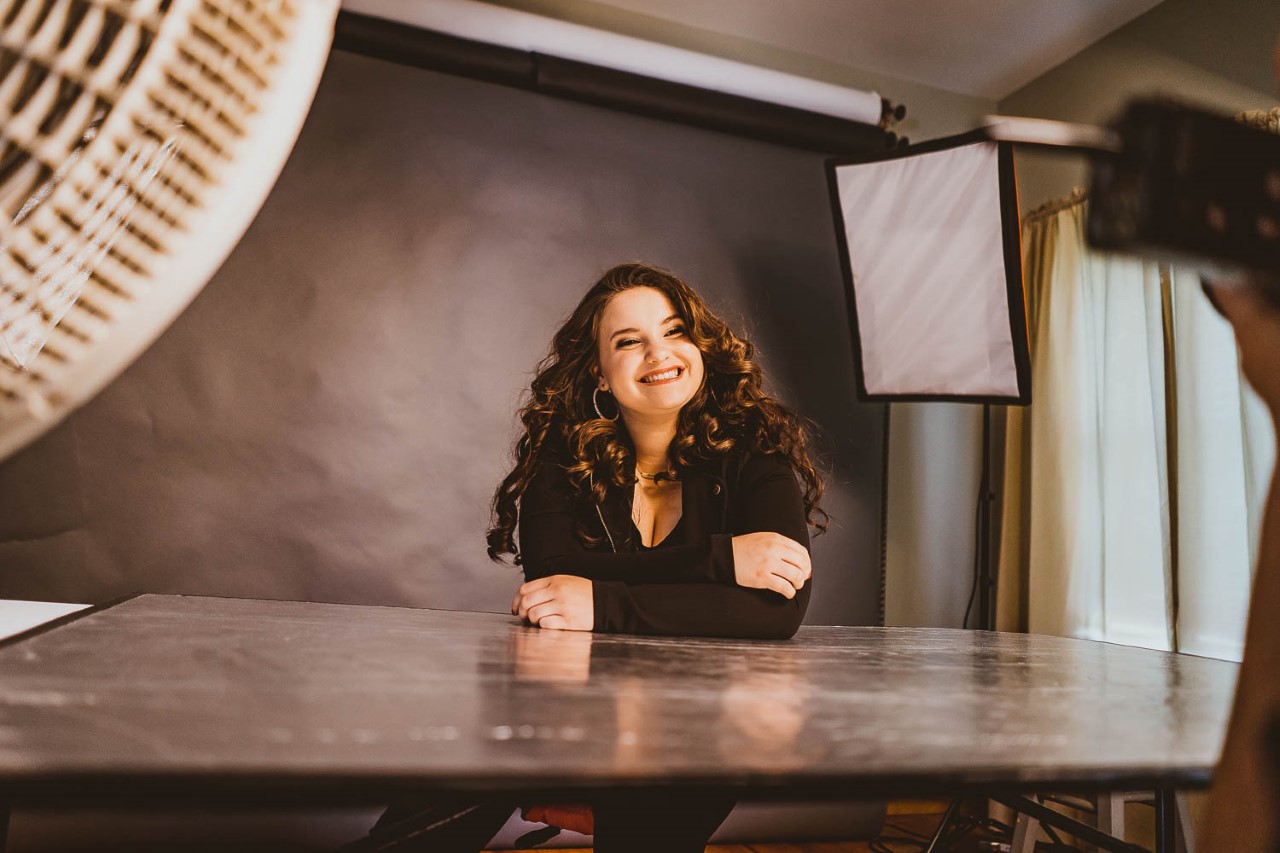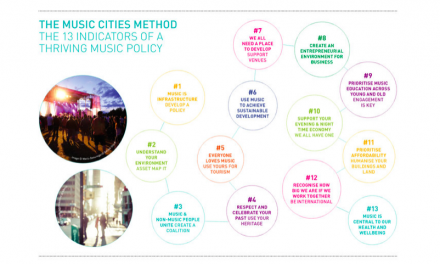Give Sadie Dupuis a call and you’ll be greeted by “The Hamsterdance Song.” It’s her customized ringtone. When asked if she chose the tune herself, you can almost hear her grinning, “Oh I sure did. It was like two bucks.” The front woman of the indie rock stalwart Speedy Ortiz has been on the road for the past year, touring on the band’s latest record Twerp Verse which dropped in April, taking a break for a short book tour for her poetry collection “Mouthguard” that was published in November.
“It’s a very weird, isolating thing to be on tour for a year at a time, I just did the saddest thing when I got home last night,” she laughs. “‘I’m gonna circle every day on a calendar that I get to sleep in my own bed,’ just wallowing. It’ll be no more than eight days.”
Though exhausting, it’s a pretty normal routine for the Northampton-based band, who have been critically acclaimed since their powerful 2013 debut Major Arcana. The album made Pitchfork’s “Best New Music” and Dupuis’ lyrics were referred to as “clever and literary, offering so much to latch onto and explore that they all but demand a strong cult following.” They hit the ground running with a short tour opening for The Breeders and later headlined with artists like Hop Along along with their own notable openers such as Mitski, Palehound and (Sandy) Alex G for their celebrated Foil Deer record.
Before Speedy played their final show of their Twerp Verse tour in Woodstock on Dec. 2, Dupuis chatted with The Collaborative about the time and effort that went into the project, using the band as a platform to speak out and her love for recording in the comfort of her own home.
COL: While touring on this record, have any songs been received by different audiences in a significant way?
Sadie Dupuis: It would be hard for me to think about the meaning it takes on for people, because it’s a little bit out of my hands. I feel like the way that we have worked the last couple of records, we have really tried to move away from live sounding recordings. On the Foil Deer record, we played some of the songs live for recording and this one we really just did in the studio, which is it’s own little wierd void, vacuum situation. So, we didn’t have a sense of how people would react to the songs. One that’s been a fun surprise for me–and one of our favorite songs while recording–was “I’m Blessed.” It seems like a crowd favorite and it’s nice when those things sync up but you didn’t have the affirmation prior to recording it.
I hesitate to call myself a snob, but the songs I’m always gravitating to on the records are never the singles. So, it makes me excited when a song that isn’t a single is the one people seem to connect to.
COL: Twerp Verse seems to cover such a wide range, from the heaviness and depth of “Villain” to something poppy like “Lucky 88” that still has that bite. What were your goals in choosing the sound of this record?
SD: I think a big part of what shapes the record is that I played more of a role in the pre-production and even the production side of things, which I haven’t done. We always credit ourselves as producers because we’re arranging every bit of music but typically we’re working with one engineer. This was a very different process where it started with me home recording. After having worked on my solo project Sad13 I got really into synth and drum machine production so there’s a lot more of that on this record than previous Speedy stuff, simply because we were in the studio anywhere between four days and a couple weeks. You don’t have time to experiment with everything a studio has, especially with songs like ours that have so many little detailed, overdubbed [parts]. You can’t just nerd out on a synth part that happens for one second.
The lucky thing here is that, because I got more confident when I produced and recorded my own record…production started in my house for the first time and I think that was a big part in shaping what the arrangements could do, and that they could be heavy but also have some of the home recorded pop elements that I’ve gotten into. One factor in it is that in every step of the recording process, it has a really different identity. It starts in my house, as lo-fi as it could possibly get; then we recorded in Silent Barn, which no longer exists and wasn’t lo-fi but it was scrappy in a way. It was designed to be accessible to the DIY community. We mixed it with Mike Mogis, a Saddle Creek legend who did Rilo Kiley and Cursive and is a member of Bright Eyes, just a really accomplished engineer. It was like a dream studio. We spent three weeks mixing it so the heavy parts got to be heavier and the pop parts got to be a little twinklier. He really was able to make every sound have it’s own place. It was mastered by Emily Lazar, who has worked with everybody from Beck and Foo Fighters to Sia. There’s a lot of that push pull on the record, so that’s why it exists in that space.
COL: Was Sad13 your first time diving into self-recording and producing?
SD: The very first Speedy Ortiz record, like prior to Major Arcana, there’s a record which I feel like we don’t count as one of our records–it’s really like, my solo record. I really like home recording so I was like, “I’m gonna start a band where I play all the instruments and record everything,” so that’s what the first Speedy Ortiz record was and after that I got a live band to do those songs. Then we were getting booked for shows and became a band and at that point I didn’t want to be recording us because I couldn’t do us justice, but I missed being able to home record. It’s really its own art form and one that I’ve always been intrigued by. It’s kind of why I did Sad13.
COL: Lyrically, sometimes it feels like your style is to flow through this storyline, trying to fit in as many words as possible while the instrumentals support you–giving you a moment to breathe. Is that something that is intentional when you and the band are arranging a song?
SD: It’s kind of the opposite way. I tend to write the music first, or the majority. I’ll know what the chord progression is, what kind of instrumentation I want, what the guitar, the bass and the drums will be doing. Then I’ll have an idea for a vocal melody and try to write lyrics that fit.
More often than not I’m trying to fit the lyrics in and around the music but I do have a tendency–just from liking a bunch of different genres of music but, lyrically, the most intrigued by rappers–of cramming a lot of things in and not repeating myself, which isn’t exactly the hallmark of every rapper, but the ones I like the most. I’m trying to do more with the rhythm of fitting a lot of words in putting in a lot of little jokes that maybe you don’t get the first three listens.
I look at other bands when they print their liner notes and they’ll have like 10 lines of something, or maybe it’s even like five lines repeated twice. I’m like, “Jeez.” It’s a struggle every time we do it. I do the album artwork as well and I always want to include the lyrics because I’m like, “I’m proud of them, people seem to like the lyrics so let’s print them in there,” but it’s a struggle to try and package them.
COL: The finale, “You Hate the Title,” feels like it could apply to so many situations, like the way people tend to make excuses for something or someone who act in a way that seem wrong, but they don’t want to rock the boat.
SD: Yeah, in a broad way it’s about people who make excuses not to listen. In that sense it was about tone policing, or people who are like, “I support that cause but I don’t agree with the methods in which they protest,” or “I believe survivors but I don’t agree with the way she came forward with the details of her assault.” It’s about people who selectively listen, calling out that hypocrisy… it’s almost like a joke song, in the way that it sounds. It’s the cute finale song, where it would be sort of the obvious choice to end on an epic sounding song. “Moving In” is a long one that has lots of parts and we wanted it to end on an optimistic tone because there are some heavy subjects throughout the record.
COL: In terms of those heavy subjects, Twerp Verse covers surviving sexual violence (“I’m Blessed”) and just a general feeling of constant male oppression of personal space and consent (“Villain”). Are there elements of the record you thought would resonate with other women, but men maybe wouldn’t pick up on?
SD: No, I mean, I think this record is for everybody. I wouldn’t say I’m particularly calling out men. A lot of the particular qualms I’m raising are larger than just men. A lot of it is maybe people who aren’t aware of their class privileges, or even the privilege that whiteness brings and I’m not excused from any of the diatribes in here. I think that there’s definitely self-critique and reflection, so it’s not just that men need to do better–although they do. It’s that white people need to better, the wealthy need to do better and everyone needs to learn how to be a better listener so that communities can be more inclusive.
I feel like my most scathing songs are always about me feeling like I need to do better, and not just on this record. In other Speedy records I’m just wallowing, like, “I suck.” [laughs] It’s still that way but I just feel like everybody should have some amount of healthy self-flagellation to investigate how they’re doing in the world.
Speedy Ortiz played Colony, Woodstock with Guerilla Toss and TOP Nachos on Sunday Dec. 2, 8 PM.





